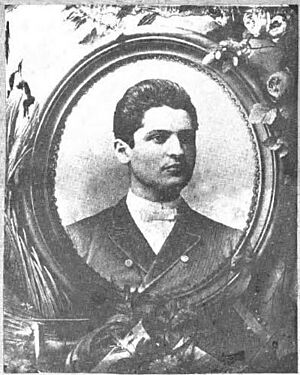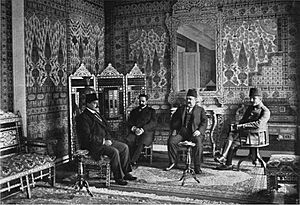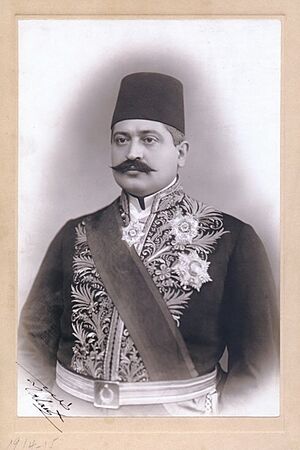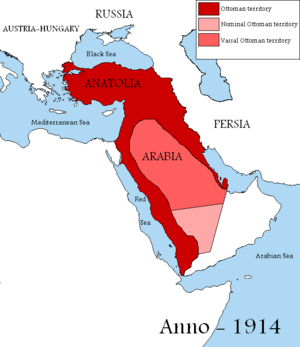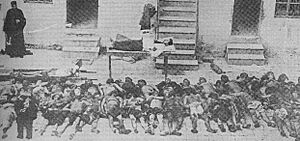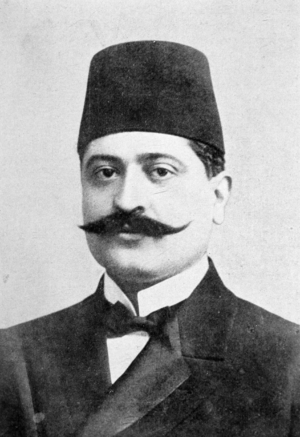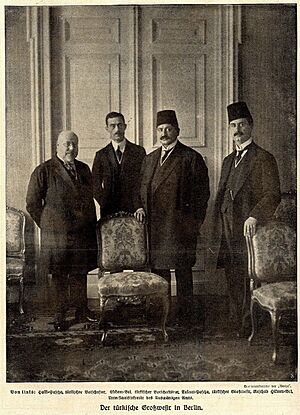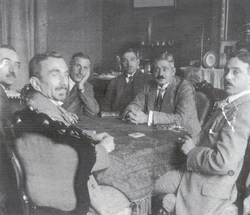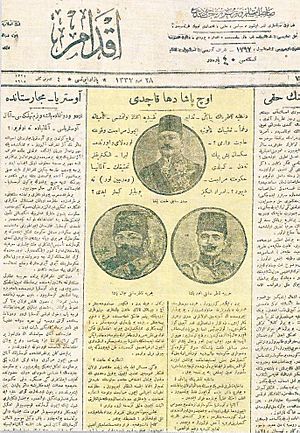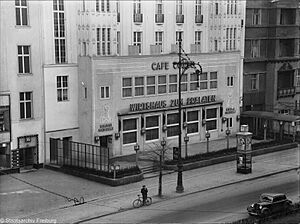Talaat Pasha facts for kids
Quick facts for kids
Mehmed Talaat
Pasha
|
|
|---|---|
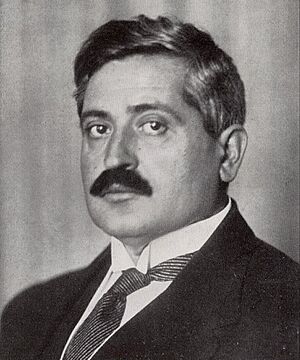 |
|
| Grand Vizier | |
| In office 4 February 1917 – 8 October 1918 |
|
| Monarch | Mehmed V Mehmed VI |
| Preceded by | Said Halim Pasha |
| Succeeded by | Ahmed Izzet Pasha |
| Minister of the Interior | |
| In office 12 June 1913 – 8 October 1918 |
|
| Grand Vizier | Himself Said Halim Pasha |
| Preceded by | Mehmed Adil |
| Succeeded by | Mustafa Arif |
| In office August 1909 – March 1911 |
|
| Grand Vizier | İbrahim Hakkı Pasha Hüseyin Hilmi Pasha |
| Preceded by | Mehmed Ferid Pasha |
| Succeeded by | Halil Menteşe |
| Minister of Finance | |
| In office November 1914 – 4 February 1917 |
|
| Grand Vizier | Said Halim Pasha |
| Preceded by | Mehmed Cavid |
| Succeeded by | Abdurrahman Vefik Sayın |
| Member of the Chamber of Deputies | |
| In office 17 December 1908 – 8 October 1918 |
|
| Constituency | Adrianople (1908, 1912, 1914) |
| Personal details | |
| Born | 1 September 1874 Kırcaali, Ottoman Empire (now Bulgaria) |
| Died | 15 March 1921 (aged 46) Berlin, Germany |
| Cause of death | Assassination by gunshot |
| Resting place | Monument of Liberty, Istanbul |
| Nationality | Ottoman |
| Political party | Union and Progress Party |
| Spouse | Hayriye Talaat Bafralı |
Mehmed Talaat (born September 1, 1874 – died March 15, 1921), often called Talaat Pasha, was an important Ottoman politician. He was a key leader of the Ottoman Empire from 1913 to 1918. Talaat Pasha was the head of the Committee of Union and Progress (CUP), a powerful political group. During World War I, he became the Grand Vizier (like a prime minister). He is known for his role in the forced relocation and deaths of many Armenians and other groups during his time as Minister of Interior Affairs.
Talaat was an early member of the CUP. He helped bring back the constitution and parliament in 1908. He was elected as a deputy and later became the Minister of the Interior. He was also involved in the events that led to Sultan Abdul Hamid II losing power in 1909. After several challenges, Talaat and the CUP became strong Turkish nationalists.
In 1913, Talaat, Ismail Enver, and Ahmed Cemal (known as the Three Pashas) took control of the Ottoman government. Talaat was the main civilian leader of this group. He and Enver were important in bringing the Ottoman Empire into World War I. During the war, he ordered the arrest and forced movement of Armenian people. These actions led to the deaths of many Armenians.
Talaat Pasha became Grand Vizier in 1917. He helped negotiate the Treaty of Brest-Litovsk, which brought back some Ottoman lands. However, the Ottoman Empire faced defeat in World War I, and Talaat resigned in 1918. He then fled the Ottoman Empire. An Ottoman court later sentenced him to death while he was away. He lived in Berlin and supported the Turkish National Movement. In 1921, he was killed in Berlin by Soghomon Tehlirian, an Armenian.
Contents
Early Life and Activism
Childhood and Education
Mehmed Talaat was born in 1874 in Kırcaali, a town in the Ottoman Empire. His family was middle-class. When he was young, his family had to flee their home because of the 1877–1878 war with Russia. This experience helped shape his strong nationalist feelings.
Talaat's father died when he was eleven, so he had to take care of his mother and two sisters. He was expelled from military school at age sixteen. Without a degree, he started working as a postal clerk in Adrianople to support his family. He also taught Turkish at a Jewish school to earn more money.
Standing Up to the Sultan
The Ottoman Empire was ruled by Sultan Abdul Hamid II, who had a secret police and censored information. Many young people, including Talaat, secretly rebelled against this rule. Talaat was arrested in 1893 for sending a suspicious telegram.
After being released, he joined the Committee of Union and Progress (CUP). This was a secret group that wanted to change the Sultan's rule. He was jailed again in 1896 for being part of the CUP. After two years, he was released but sent away to Salonika (now Thessaloniki). There, he continued his secret activities while working as a postal clerk. He used his job to smuggle newspapers from people who disagreed with the government.
In 1906, Talaat helped form another secret group, the Ottoman Freedom Committee (OFC). Many army officers joined this group. In 1907, the OFC joined with the CUP, making Talaat a key leader within the CUP in the Ottoman Empire.
Rise to Power: 1908–1913
The Young Turk Revolution
In 1908, a revolution started, led by the CUP. Talaat helped plan to remove the Salonika garrison commander, who was loyal to the Sultan. This and other actions by the CUP made the Sultan agree to bring back the parliament and constitution.
Talaat was easily elected as a deputy for Adrianople. He became the parliament's deputy-president. A year later, in 1909, there was an attempt to bring back the Sultan's full power. Talaat and other leaders had to hide. But pro-constitution forces, called the Action Army, crushed the revolt. Talaat played a role in removing Sultan Abdul Hamid II from power.
In August 1909, Talaat became the Minister of the Interior. This made him a very powerful figure. He continued some of the previous government's rules, like those against Jewish settlement in Ottoman Palestine. He also worked to control rebellious areas like Albania and Yemen.
Challenges for the Committee
Tensions grew between the CUP and other political groups. Talaat stepped down as Interior Minister in March 1911. For the 1912 election, Talaat became the Minister of Post and Telegraph to help the CUP win.
The CUP won the 1912 election, but there were many accusations of cheating and violence. This led to a group in the military, called the Savior Officers, trying to overthrow the CUP. Talaat had to go into hiding again. By 1912, Talaat no longer believed that different ethnic groups could unite under one Ottoman nation. He turned to more extreme Turkish nationalist ideas.
The First Balkan War began, and the Ottoman Empire suffered major defeats. Talaat wanted to fight on, but the government eventually agreed to peace talks. In January 1913, Talaat and Enver led a successful takeover of the government, known as the Raid on the Sublime Porte. This brought the CUP back into power. Talaat became the deputy Interior Minister. He pushed for the Empire to keep fighting to regain Adrianople and ordered the arrest of opposition leaders.
Union and Progress Rule: 1913–1918
Gaining Full Control
After the assassination of Mahmud Şevket Pasha in July 1913, the CUP gained almost complete control of the Ottoman Empire. Talaat became the Interior Minister again in Said Halim Pasha's government. He held this position until the end of World War I in 1918. Talaat, along with Enver and Ahmet Cemal, formed a powerful group known as the Three Pashas. These three leaders effectively ran the Ottoman government.
In the summer of 1913, the Second Balkan War began. The Ottomans joined the war and managed to retake Adrianople. Talaat took part in this recapture. This event taught him and the CUP not to take international diplomacy too seriously if the situation on the ground was different. He negotiated peace treaties with Bulgaria and Greece. However, there were still tensions, and Talaat, Enver, and others organized the forced movement of Greek people in some areas, which almost led to another war with Greece.
Between 1911 and 1914, the Ottoman Empire discussed reforms in the eastern parts of the country with European powers and Armenian political groups. Talaat met with Armenian politicians, but trust was low, and the CUP's ideas became more extreme. In September 1914, Talaat Pasha sent a telegram to governors to prepare for the arrest of Ottoman Armenian citizens. Armenian and Assyrian groups began forming militias to protect themselves.
Entering World War I
The Ottoman Empire felt alone in its foreign relations, which led to losing land in the Balkans. Talaat and others tried to form an alliance with Russia, but it failed. However, Talaat, Enver, and Halil succeeded in making a secret alliance with Germany in 1914. After two German warships were sold to the Ottomans, the three leaders convinced Cemal Pasha to attack Russia by sea. This led to declarations of war. Talaat then became the Minister of Finance.
Talaat and the CUP hoped the war would free the Empire from foreign control. They ended old agreements with European powers, stopped foreign postal services, and ended Lebanon's self-rule. They also stopped reforms for the eastern provinces. These actions were celebrated by many in the Empire.
However, early defeats in the war, like Enver Pasha's loss in the Battle of Sarikamish, made Talaat feel down. He tried to keep spirits up by sharing false news of victories.
Forced Relocations and Deaths
Reports of violence against Armenians in Van caused more problems between the CUP and Armenian groups. On April 24, 1915, Talaat Pasha ordered the closure of Armenian political groups and the arrest of their members. He said these groups were causing trouble and helping Russian forces. This order led to the arrest of many Armenian community leaders in Constantinople, most of whom were later killed. Many historians see these arrests as the start of the events that led to the deaths of many Armenians.
Talaat then issued an order for the mass forced movement of Armenians. This was a main way that large numbers of Armenians died. People who were forced to move did not receive much help. There is no proof that the Ottoman government provided enough food or supplies for hundreds of thousands of people during their long marches to the Syrian Desert. Many died during these journeys. Talaat, who was a telegraph operator, used a machine in his home to send direct orders to provincial governors about these movements.
Many diplomats and important people spoke to Talaat Pasha about these forced movements and reports of deaths. He had several talks with the United States ambassador, Henry Morgenthau, Sr.. In one conversation, Talaat said that their policy was fixed and that Armenians would not be allowed anywhere in Anatolia. He also said that three-quarters of the Armenians had already been dealt with.
Talaat believed that moving Armenians would make up for the forced movement of Muslims during the Balkan Wars. He also wanted to settle Muslim refugees in the empty Armenian properties.
The Assyrian Christian community was also targeted. Talaat ordered the removal of Assyrian people in some areas, leading to many deaths. Later, Talaat ordered the forced movement of Pontus Greeks from the Black Sea coast.
Talaat was also a key figure in the forced movement of Kurds. In May 1916, he ordered Kurds to be moved to western Anatolia. He wanted to prevent Kurds from becoming too numerous in certain areas. He aimed for Kurdish populations to be no more than 5% in any region. Many Kurds also died from hunger due to neglect during these movements.
About 1.7 million Christians, including Greeks and Lebanese Christians, died during World War I. The total Ottoman war deaths were around 3.7 million, which was 14% of the population before the war. The Ottoman Interior Ministry reported that the Armenian population in the Empire decreased significantly.
Becoming Grand Vizier
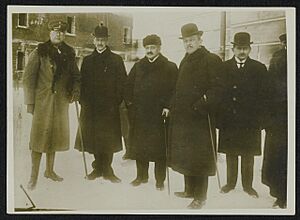
On February 4, 1917, Talaat became the Grand Vizier of the Ottoman Empire, while also remaining Minister of the Interior. This made him the first member of parliament to become a Prime Minister in Ottoman history. This move gave the CUP complete control of the government.
Talaat Pasha spoke to parliament about his plans to modernize Ottoman society to be like European civilization. He believed that Turkey needed to join modern civilization to be saved. He also promised to crack down on corruption.
Many social changes were introduced under his leadership. These included updating the calendar, allowing women to work as nurses and in other roles, and adding new subjects at Istanbul University. A new family law in 1917 improved women's rights and made marriage laws more secular. The Quran was translated into Turkish, and the call to prayer was even given in Turkish in some mosques. These changes helped prepare the way for later reforms by Atatürk.
Talaat also had disagreements with Enver Pasha, especially over rationing for the army. Talaat created the Ministry of Rationing and put a loyal friend in charge.
In March 1918, Talaat himself negotiated the Treaty of Brest-Litovsk. This treaty returned Kars, Batumi, and Ardahan to Ottoman rule. Another treaty with the Caucasian states strengthened the Ottoman position, leading to the capture of Baku in September. Spring 1918 was the peak of Talaat Pasha's political career.
However, the Ottoman Empire slowly realized it was losing World War I. British forces defeated Ottoman armies in the Middle East. Also, Bulgaria surrendered to the Allies, leaving the Ottoman capital open to attack. With defeat certain, Talaat Pasha resigned on October 8, 1918. Ahmed Izzet Pasha became the new Grand Vizier and signed the Armistice of Mudros, ending the war for the Ottomans on October 30.
Exile and Death: 1918–1921
Escape to Germany
Talaat Pasha gave a farewell speech at the last CUP meeting on November 1, where the party decided to break up. That night, he and other CUP leaders fled the Ottoman capital on a German torpedo boat. They landed in Crimea and then went their separate ways. Before leaving, Talaat wrote a letter promising to return to Turkey. His sudden departure surprised many.
Talaat and some other Turkish officials ended up in Berlin on November 10. The new German leader secretly allowed Talaat to stay in Germany. Talaat lived in an apartment under a false name. He founded the "Oriental Club" where anti-Allied Muslims and Europeans met. Even though he was wanted by the Ottoman government and Britain, Talaat managed to travel to other European countries. He spoke out against the new world order created by the Allies.
Talaat kept in touch with Mustafa Kemal Pasha (Atatürk), the leader of the Turkish National Movement. Kemal and Talaat had friendly relations. From Berlin, Talaat secretly gave orders to Turkish commanders in the early stages of the Turkish War of Independence. He hoped to use Kemal as a puppet leader. He also stayed in contact with other important Turkish figures. He helped bring together Turkish nationalists, German nationalists, and Bolsheviks.
Trial and Conviction
The British government pressured the Ottoman government to put Ottoman leaders on trial for their actions during the war. Talaat's property was taken by the government. Courts were set up to punish the CUP for the Empire's involvement in World War I.
By January 1919, a report accused over 130 high-ranking officials, including Talaat. They were accused of causing Turkey to enter the war and of the "massacre and destruction of the Armenians." The court said that the deaths of Armenians were decided by the CUP's Central Committee. On July 5, 1919, the court announced its decision: Talaat's title of Pasha was taken away, and he, Enver, Cemal, and others were sentenced to death while they were away.
The British government continued to watch Talaat. They knew he was in Germany and pressured the Ottoman government to ask Germany to send him back. Germany knew Talaat was there but refused to hand him over.
Assassination and Burial
With most CUP leaders in exile, Armenian groups planned to kill those responsible for the Armenian deaths. On March 15, 1921, Talaat was killed by a single bullet as he left his apartment in Berlin. His killer was Soghomon Tehlirian, an Armenian whose family members had died during the events. Tehlirian admitted to the shooting. After a short trial, he was found innocent by a German court. The court believed he acted due to temporary insanity caused by his traumatic experiences.
According to his wife, Hayriye, Talaat had predicted his own death. He reportedly said, "One day, someone will shoot me... For each Talaat passing away, one thousand Talaats shall come forth." Mustafa Kemal Pasha said, "The motherland has lost her great son; the revolution has lost its great organizer."
Talaat's friends hoped he could be buried in Turkey, but neither the Ottoman government nor the Turkish nationalist movement wanted his body at first. He was seen as a controversial figure. On March 19, he was buried in a cemetery in Berlin. Many important Germans attended the ceremony. The German foreign office sent a wreath. In 1922, the Turkish government canceled Talaat's conviction. His family was granted a house and a pension in 1926.
During World War II, at the request of the Turkish Prime Minister, Talaat's remains were moved from Germany to Turkey. He received a state funeral on February 25, 1943. He was buried at the Monument of Liberty. His return to Turkey was welcomed by Turkish society.
Legacy
Historians widely consider Talaat Pasha to be one of the main people responsible for the deaths of many Armenians. A law student named Raphael Lemkin, who followed Talaat's trial, later created the term genocide to describe such events.
In his writings published after his death, Talaat claimed that all Ottoman Armenians were rebels and traitors. These writings were often published when the topic of Armenian deaths was discussed.
In Turkey, Talaat Pasha is often seen as a "great statesman" and a "skillful revolutionary." Many schools, streets, and mosques are named after him. In Turkey, he and the other Two Pashas are mainly criticized for causing the Ottoman Empire to enter World War I and for its later breakup.
Images for kids
 | Claudette Colvin |
 | Myrlie Evers-Williams |
 | Alberta Odell Jones |


